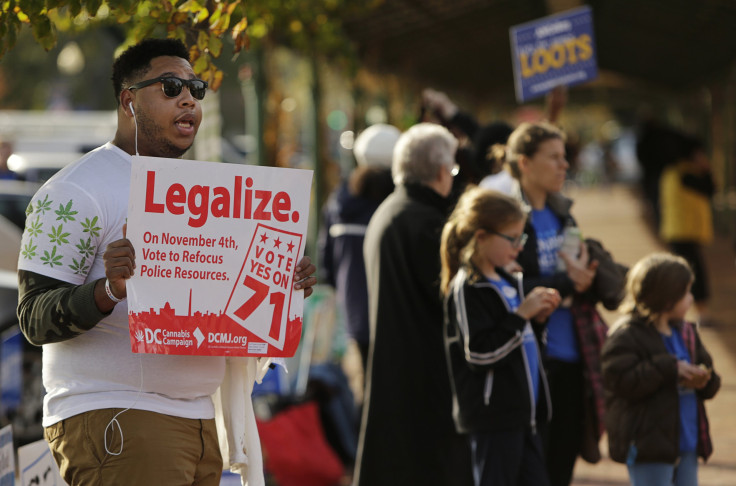Marijuana Legalization: How The War On Drugs Is 'A War On Black And Brown People'

Momentum for marijuana legalization is growing across the country after voters in Oregon and the District of Columbia voted Tuesday for measures that will no longer make it a crime to possess pot. But for millions of blacks across the country, the justice system and the ongoing so-called war on drugs are still stacked against them.
Even though blacks and whites use marijuana at the same frequency rate, African-Americans in the U.S. are arrested for pot possession 3.4 times more than whites are. In Oregon, blacks are four times more likely to be arrested for pot possession than their white neighbors. “The war on marijuana has been a failure,” said Becky Straus, legislative director for the American Civil Liberties Union of Oregon. “We see [marijuana legalization] as a really important criminal justice issue and a racial justice issue.”
The statistics are even worse in D.C., where blacks are arrested for marijuana possession nearly eight times as much as whites, despite blacks being 50 percent of the population and whites representing 41 percent. “The level of disparity is outrageous,” said Shaleen Title, board member for the group Marijuana Majority.
Blacks are also at a disadvantage when they are released from jail or prison on marijuana possession charges, research shows. It makes it more difficult for them to get jobs if they have criminal records, even if their only offense is marijuana possession. People convicted for pot also don’t have full eligibility to receive student loans and grants for college for at least a year after their conviction. Some 60,000 prisoners will be returning home this year in D.C., or about 10 percent of the city’s population.
While the ballot initiatives passed in Oregon and D.C. may change the present reality of possessing pot, they won’t right the wrongs of the past. Those jailed or imprisoned on marijuana possession charges will remain there because the laws won’t apply retroactively.
And in states like Colorado and Washington, national leaders on marijuana legalization, ex-convicts who served time for marijuana possession have been banned from participating in the new marijuana economy, further dampening their job prospects.
“People who have criminal records are discriminated against in the regular economy already,” said Malik Burnett, policy manager for the Drug Policy Alliance in New York City.
D.C.’s marijuana legalization bill still has to be drafted by the city council. The passing of the ballot initiative was a symbolic vote. Some marijuana legalization advocates want the District to allow ex-cons to be allowed to work in the D.C. dispensaries created through the bill.
In Oregon, state officials have pledged to give some marijuana proceeds to local schools. Another slice will go to state and local police for enforcement. The rest will go toward drug treatment.
The legalization laws in Colorado and Washington were seen mostly as personal liberty issues, while D.C.’s pot possession effort addresses the racial disparities in enforcing drug laws, according to Seema Sadanandan, policy and advocacy director for the ACLU of the capital.
“It’s realizing the war on drugs is a war on black and brown people,” she said. The new measure “can be a powerful step for racial justice.”
© Copyright IBTimes 2025. All rights reserved.






















